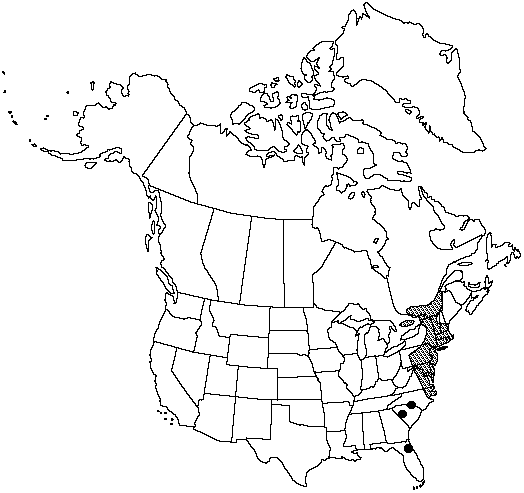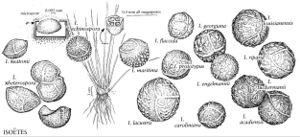Difference between revisions of "Isoëtes riparia"
Flora 29: 178. 1846.
FNA>Volume Importer |
FNA>Volume Importer |
(No difference)
| |
Revision as of 18:55, 24 September 2019
Plants usually aquatic, occasionally emergent. Rootstock nearly globose, 2-lobed. Leaves evergreen, bright green, pale toward base, spirally arranged, often twisted, to 35(–50) cm, pliant, gradually tapering to tip. Velum covering less than 1/2 of sporangium. Sporangium wall brown-streaked to completely brown. Megaspores white, 450-650 μm diam., cristate with isolated and branching, lamellate ridges; girdle obscure. Microspores gray to light brown in mass, 30–40 μm, tuberculate. 2n = 44.
Phenology: Spores mature late summer.
Habitat: Margins of lakes, ponds, and streams, tidal shores and estuaries
Distribution

Calcareous to slightly acidic substrates in fresh, usually oligotrophic, water, Ont., Que., Conn., Del., Fla., Maine, Md., Mass., N.H., N.J., N.Y., N.C., Pa., R.I., S.C., Vt., Va., W.Va.
Discussion
Megaspore morphology, electrophoretic profiles of leaf enzymes, and chromosome number provide evidence that Isoëtes riparia is an allotetraploid, formed by chromosome doubling in I. x eatonii, the primary diploid hybrid between I. echinospora and I. engelmanii. The considerable variation in leaf and spore morphology possibly results from multiple allotetraploid origins.
Isoëtes riparia hybridizes with I. echinospora [ = I. x dodgei A. A. Eaton]; I. engelmannii [ = I. x brittonii Brunton & W. C. Taylor]; I. lacustris [ = I. x jeffreyi D. M. Britton & Brunton); and I. tuckermanii.
Selected References
None.
